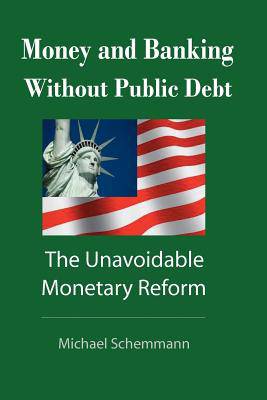
- Afhalen na 1 uur in een winkel met voorraad
- Gratis thuislevering in België vanaf € 30
- Ruim aanbod met 7 miljoen producten
- Afhalen na 1 uur in een winkel met voorraad
- Gratis thuislevering in België vanaf € 30
- Ruim aanbod met 7 miljoen producten
Zoeken
Money and Banking Without Public Debt
The Unavoidable Monetary Reform
Michael Schemmann
Paperback | Engels
€ 20,95
+ 41 punten
Omschrijving
In my opinion, the United States is facing monetary reform within the lifetime of most of its citizens, because the world is not able to continue to carry its public debt. Europe, too, is over-burdened. The old remedy of growth, expansion of the money supply, and resulting inflation has run its course. To devalue the dollar further to five cents and then one cent of its 1950 purchasing power would result in an exponential decline not even seen in South America. The monetary reform can be along the lines of the American Colm-Dodge-Goldsmith Plan imposed by the U.S. Military government on Germany in 1946 (implemented in 1958), with the significant difference that the U.S. productive capacity, the level of employment though lower than desired, and its infrastructure are intact. What needs to be fixed is the $15 trillion national debt, the staggering unfunded liabilities of $113 trillion, and the banking system. Quasi money is not even acceptable to the banks themselves and must be eliminated by putting deposits under a near 100% liquidity cover of federal funds, eliminating the national debt in the wash-up. A conversion of old currency into new may be necessary given the enormity of the unfunded liabilities of nearly ten times GDP, which are growing exponentially and coming home to roost. The tax system needs to be overhauled so that to meet the burden without killing the economy. The national debt itself, can be redeemed as outlined in my booklet, "Money in Crisis", 2nd edition, by repaying the debt with redemption certificates while increasing banks' reserve requirements, so that the redemption receipts cannot be booked as deposits and increase the money supply, but, for example, as capital subscriptions, which is preferable to outright U.S. national debt repudiation, because the U.S. national debt cannot be repaid with taxes; it is at the point of no return.
Specificaties
Betrokkenen
- Auteur(s):
- Uitgeverij:
Inhoud
- Aantal bladzijden:
- 68
- Taal:
- Engels
Eigenschappen
- Productcode (EAN):
- 9781456574017
- Verschijningsdatum:
- 23/01/2011
- Uitvoering:
- Paperback
- Formaat:
- Trade paperback (VS)
- Afmetingen:
- 152 mm x 229 mm
- Gewicht:
- 104 g

Alleen bij Standaard Boekhandel
+ 41 punten op je klantenkaart van Standaard Boekhandel
Beoordelingen
We publiceren alleen reviews die voldoen aan de voorwaarden voor reviews. Bekijk onze voorwaarden voor reviews.











